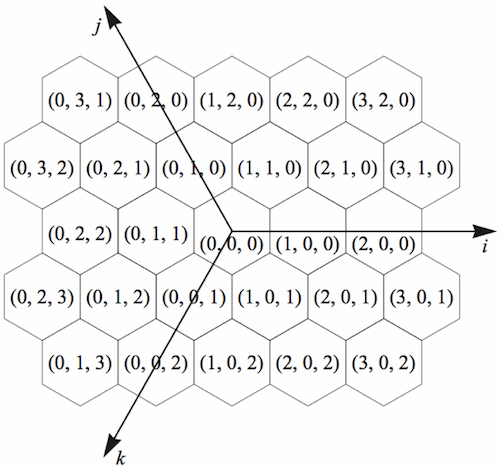Indexing
- Cells are uniquely identified by a
UInt64index. The only global indexing system is through these values.- You can create cells from its index or from coordinates that are contained in the cell:
Cell(index)orCell((lon, lat), res=10).
- You can create cells from its index or from coordinates that are contained in the cell:
- However, H3 supports several other indexing systems that are valid within a single face of the icosahedron.
- HexEarth uses several different
getindexmethods to expose these indexing systems.
Index ordering is not consistent. I.e. there are no directional guarantees as to where cell[1] is relative to cell.
julia> using HexEarthjulia> new_york = (-74, 40.7)(-74, 40.7)julia> cell = Cell(new_york)⬡ Cell 10 (-74.00025337207035, 40.699690184228594)julia> cell[1] # spiral indexing (1-6) for immediate neighbors⬡ Cell 10 (-74.00179375894132, 40.70002575242847)julia> cell[0, 1] # https://h3geo.org/docs/core-library/coordsystems#local-ij-coordinates⬡ Cell 10 (-74.00179375894132, 40.70002575242847)julia> cell[0, 1, 0] # https://h3geo.org/docs/core-library/coordsystems#ijk-coordinates⬡ Cell 10 (-74.00179375894132, 40.70002575242847)
Spiral Indexing
import GeoInterface as GI
using CairoMakie
fig = Figure()
ax = Axis(fig[1,1])
poly!(ax, cell)
for i in 1:6
lines!(ax, cell[i])
text!(ax, GI.centroid(cell[i]), text=string(i))
end
fig
IJ Indexing
For IJ/IJK indexing, HexEarth uses the conventions that (0,0) and (0,0,0) refer to the origin cell. For whatever reason, this is not the case in the original h3 library.
fig = Figure()
ax = Axis(fig[1,1])
poly!(ax, cell)
for i in [(0,1), (0,-1), (-1,-1), (1,1), (1,0), (-1,0)]
lines!(ax, cell[i...])
text!(ax, GI.centroid(cell[i...]), text=string(i))
end
fig
IJK Indexing
- Reference: https://h3geo.org/docs/core-library/coordsystems#ijk-coordinates
- IJK addresses are not unique unless "normalized"
- Note: normalized IJK coordinates have at most two non-zero coordinates.

fig = Figure()
ax = Axis(fig[1,1])
poly!(ax, cell)
for i in HexEarth.neighbor_indices
@info i
lines!(ax, cell[i...])
text!(ax, GI.centroid(cell[i...]), text=string(i))
end
fig